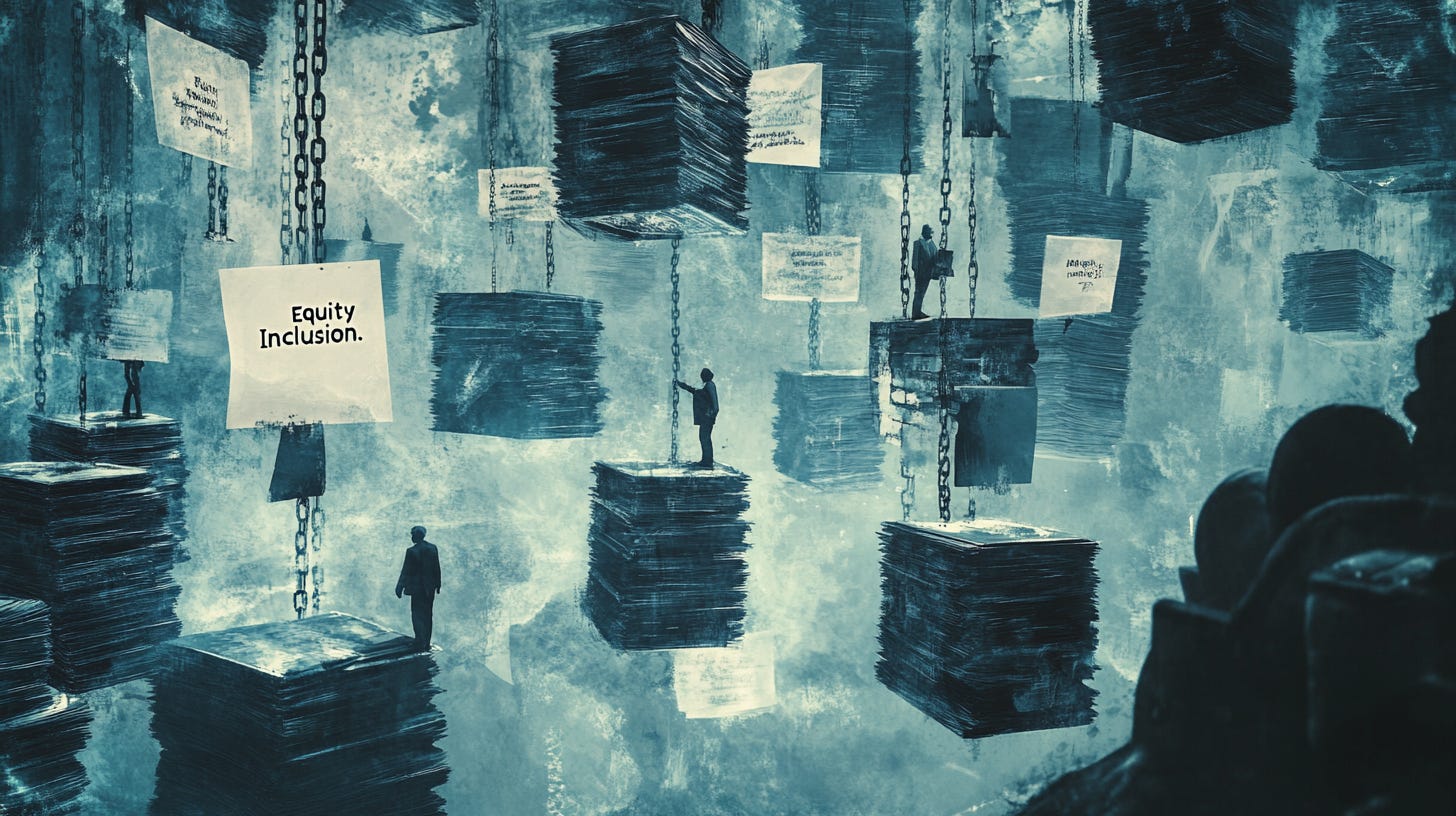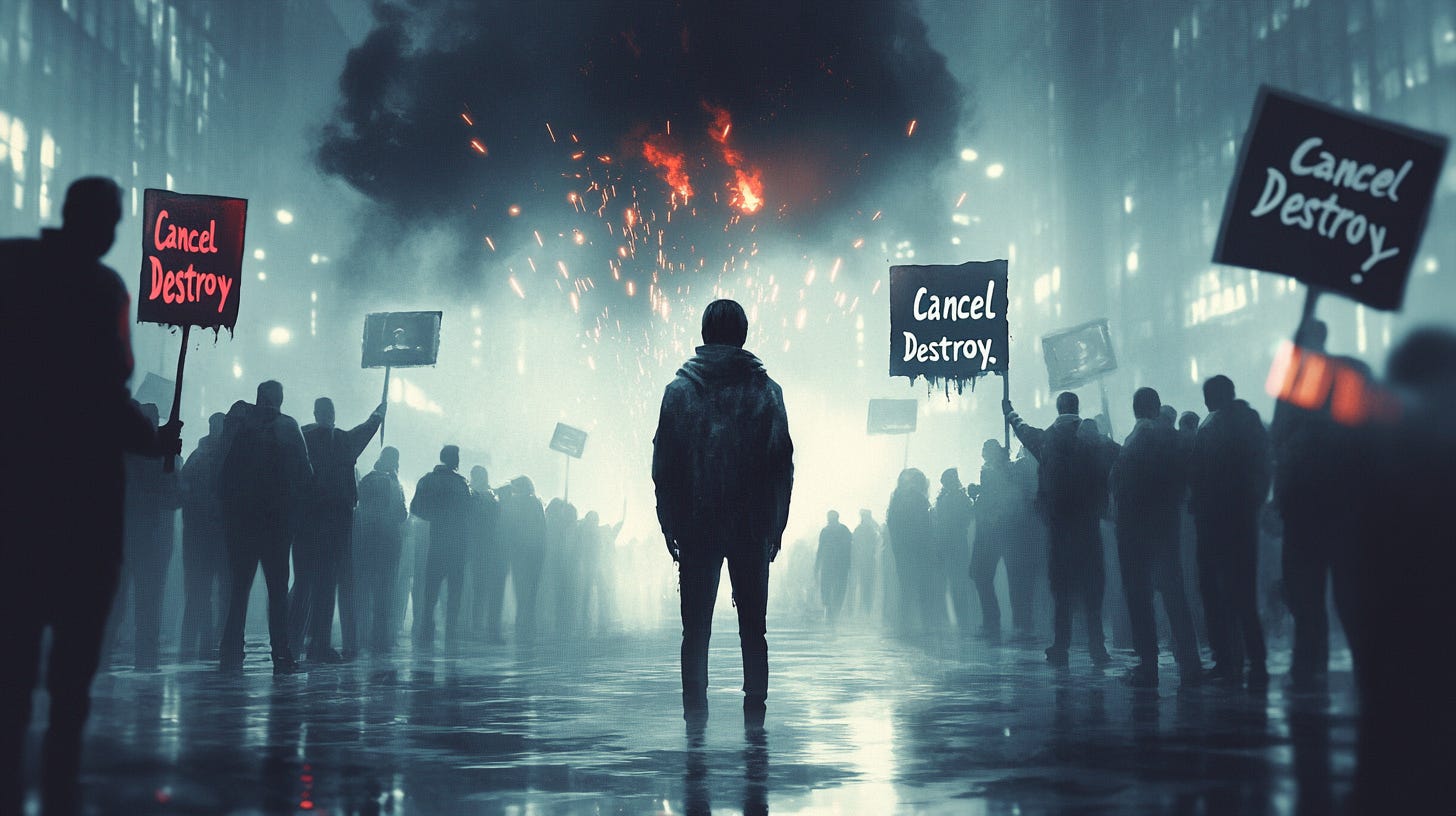Canada’s 'Woke' Nightmare: The Psychopaths Driving Our National Decline
Pathological figures have seized control of Canadian universities, media, and government, enforcing rigid ideological conformity.
What’s Rotten in Canada’s Institutions?
There’s a growing sense among Canadians that something is deeply wrong in our public institutions. Trust in politicians has plummeted, faith in the media is extremely low, and universities—once defenders of free thought—have become ideological echo chambers. Despite this unease, many struggle to pinpoint exactly what is happening. It feels as though the institutions that once upheld the fabric of Canadian society have been hijacked—but by whom, and for what purpose?
The answer may lie in the work of Polish psychiatrist Andrew Lobacewski, whose study of totalitarian systems uncovered how institutions become infected with pathological ideologies. His concept of Political Ponerology—the study of how evil infiltrates politics—maps disturbingly well onto the crisis Canada is experiencing today. While Lobacewski primarily examined communism, the process he describes parallels the rise of "Woke" or Social Justice ideology, which has captured Canada’s institutions under the guise of moral righteousness.
In pathological systems, Lobacewski explains, ideologues weaponize language and morality to mask their true intentions. Terms like "justice" and "equality" are manipulated to conceal a desire for control, imposing ideological conformity while punishing dissenters. This is no abstract theory—it’s happening in Canada’s universities, media, and government, where ideological purity trumps debate, and disagreement is met with public shaming or professional ruin.
As Lobacewski notes, these systems operate on two levels: “The terms of the original ideology are taken at face value by true believers, while party insiders substitute secondary meanings for the same terms, gaslighting normal people.” Just like the communists Lobacewski studied, today’s ideologues promise utopia but deliver authoritarian control.
Understanding this process is key to making sense of the unease Canadians feel. What we are witnessing is the erosion of reason and liberty under the guise of moral progress—a phenomenon Lobacewski called ponerization, where pathological individuals and their ideologies infect and dominate societal structures. Left unchecked, this ideological subversion could solidify its hold, leaving no room for dissent, debate, or genuine freedom.
The Architects of Ideological Subversion: Psychopathies, Characteropathies, and Schizoids
At the core of Political Ponerology is Lobacewski’s analysis of the different pathological personalities that drive ideological subversion. In Canada, we see similar figures playing complementary roles in entrenching Woke ideology.
Psychopaths—those with no empathy and a cold, calculating lust for power—are often the architects. They use ideological movements as tools for control, exploiting human emotions for manipulation. As Lobacewski writes, “they are always ready to push the buttons.” Psychopaths "read people" and "know how to play on our emotions.”
In Canada, these individuals occupy key positions in media and academia, where they subtly shape public discourse to pressure compliance, making dissent appear not just wrong but immoral. These figures charm their way into leadership roles, convincing others that their crusade is virtuous when it is actually about consolidating power.
Characteropaths serve as the enforcers. These are individuals whose personal trauma or psychological deformation turns them into fanatical devotees. In Canada, these zealots design and implement policies that enforce ideological purity, whether through diversity training or punitive measures against dissenters. They are bureaucrats who believe they are fighting for justice, but in reality, enforce rigid conformity.
Finally, there are the schizoids, intellectuals obsessed with abstract, utopian ideas detached from reality. These individuals provide the ideological foundation for the entire system. They craft grand theories that sound noble on paper—like “equity” and “inclusion”—but in practice, justify repression and control. Schizoids are often found in academia, where their theoretical frameworks justify policies that undermine free thought.
These pathological types play off one another. Psychopaths manipulate the public and exploit the ideology, characteropaths enforce it with zeal, and schizoids provide intellectual legitimacy. Together, they form a network of ideological subversion that has infected Canadian institutions, undermining reason and freedom in the name of moral progress.
The Ideological Infection: How Ponerization Happens
The gradual takeover of institutions by pathological ideologies is a process Lobacewski called ponerization. This infection doesn’t happen overnight; it’s a slow, insidious progression where normal institutions are subverted from within. In Canada, this process is unfolding as institutions that once championed meritocracy and free thought are being remade in the image of Woke ideology.
Ponerization begins when pathological individuals—psychopaths, characteropaths, and others—gain influence by leveraging charisma, ideological fervor, or intellectual credentials. In the early stages, this infection often goes unnoticed. But as these individuals move into key positions of power, they begin to shift institutional culture, replacing dissenters with those who will comply.
Lobacewski explains that ponerization is driven by negative selection, where individuals of talent and independent thought are systematically replaced by ideologically compliant figures. "After universities had been emptied of enemies, they had to be filled with ostensible supporters.” In Canada, this is evident in how diversity and inclusion policies prioritize ideological loyalty over merit, leading to declining academic standards.
The process also relies on creating a climate of fear. Those who dissent are punished—through social shaming, loss of professional opportunities, or dismissal. In this way, ponerization enforces compliance not through persuasion, but coercion. This dynamic is visible in Canadian media and politics, where challenging the Woke narrative can lead to backlash and removal from public life.
Ultimately, ponerization turns once-functioning institutions into echo chambers. As dissent is eliminated, the ideology gains total control, leaving no room for debate or genuine freedom. The longer this infection goes untreated, the deeper it takes root, leaving Canada’s institutions weaker, less free, and intellectually impoverished.
Psychological Contagion: The Spread of Ideological Hysteria
The final stage of ideological subversion is what Lobacewski calls psychological contagion. Once a pathological ideology gains a foothold, it spreads not just through formal policy but through mass psychological pressure that compels individuals to conform. This creates a climate of ideological hysteria, where fear and social pressure cause people to internalize the ideology, even if they don’t fully agree with it.
Lobacewski describes how pathological individuals exploit social tensions, manipulating emotions to create collective hysteria. In this state, rational discourse is replaced by emotional responses and moral grandstanding. "Those who try to maintain common sense and proper reasoning finally wind up in the minority," he writes, "feeling wronged because their human right to maintain their own mental hygiene is violated by pressure from all sides".” In Canada, those who question the Woke narrative are swiftly labeled as threats to social justice.
This contagion thrives on fear. Cancel culture has become an enforcement tool where careers are destroyed and reputations tarnished for stepping out of line. One wrong word can lead to social and professional ruin. The mass conformity that results is amplified by social media, which turns outrage into a constant cycle, drowning out dissenting voices.
Lobacewski explains that pathological ideologies use "conversive thinking"—where people stop processing information rationally, filtering everything through an ideological lens. In Canada, this has narrowed acceptable discourse, with only Woke views deemed legitimate. As this contagion spreads, the cost of dissent becomes too high, making resistance feel like an act of social suicide.
The Antidote to Ideological Infection and Canada’s Path Forward
As Lobacewski documents, the ideological infection of institutions by pathological individuals destroys not just organizations, but societies. In Canada, Woke ideology’s infiltration of public institutions threatens the foundations of democracy. But Lobacewski didn’t just diagnose the problem—he also offered a path forward.
The first step is recognizing the pathology. Lobacewski stresses the importance of understanding the psychological mechanisms behind ideological systems and identifying the psychopathic personalities that drive them. Awareness is the first antidote.
Next is truthful, fearless communication. In societies infected by ideological subversion, speech becomes dangerous. Lobacewski emphasizes the importance of confronting the manipulative power of psychopaths with facts. In Canada, this means fostering open discourse and resisting the pressure to conform.
Restoring ethical leadership is also crucial. Negative selection replaces competence with ideological loyalty. To heal institutions, Canada must prioritize merit, character, and open debate over ideological conformity.
Lobacewski also highlights social solidarity. Pathocracies thrive on isolation. Resisting contagion requires rebuilding social bonds based on shared values and mutual respect, promoting genuine diversity of thought and experience.
Finally, moral and intellectual renewal is key. Recovery from ideological subversion is a long process requiring a cultural shift where truth and reason are valued over ideology. Canadians must reclaim the courage to question and debate, no matter how uncomfortable.
Lobacewski’s antidote is clear: awareness, discourse, ethical leadership, and social resilience. The cost of inaction is high, but by confronting the ideological infection, Canada can rebuild its institutions and preserve the freedoms that make it worth defending.










I am not in power in any institution but I have completely & shall continue to refuse all woke language & subservience. I go out of my way to enlighten my grandchildren that what the school is teaching them are lies.